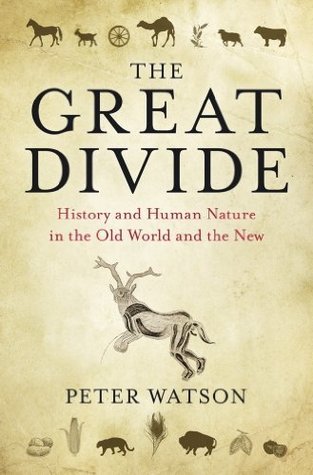
Exploring the development of humankindbetween the Old World and the New—from15,000 BC to AD 1500—the acclaimed authorof Ideas and The German Genius offers agroundbreaking new understandingof human history. Why did Asia and Europe develop far earlier than the Americas? What were thefactors that accelerated—or impeded—development? How did the experiences of OldWorld inhabitants differ from their New Worldcounterparts—and what factors influenced thosedifferences? In this fascinating and erudite history, PeterWatson ponders these questions central to thehuman story. By 15,000 BC, humans had migratedfrom northeastern Asia across the frozen Beringland bridge to the Americas. When the world warmed up and the last Ice Age came to an end,the Bering Strait refilled with water, dividing America from Eurasia. This division—with two great populations on Earth, each unaware of theater—continued until Christopher Columbus voyaged to the New World in the fifteenth century. The Great Divide compares the development of human kind in the Old World and the New between 15,000 BC and AD 1500. Watson identifies three major differences between the two worlds—climate, domesticable mammals, and hallucinogenic plants—that combined to produce very different trajectories of civilization in the two hemispheres. Combining the most up-to-date knowledge in archaeology, anthropology, geology, meteorology, cosmology, and mythology, this unprecedented, masterful study offers uniquely revealing insight into what it means to be human.
Author

Peter Watson was educated at the universities of Durham, London and Rome, and was awarded scholarships in Italy and the United States. After a stint as Deputy Editor of New Society magazine, he was for four years part of the Sunday Times ‘Insight’ team of investigative journalists. He wrote the daily Diary column of the London Times before becoming that paper’s New York correspondent. He returned to London to write a column about the art world for the Observer and then at The Sunday Times. He has published three exposes in the world of art and antiquities and from 1997 to 2007 was a Research Associate at the McDonald Institute for Archaeological Research at the University of Cambridge. He has published twelve books of non-fiction and seven novels, some under the pen name of Mackenzie Ford. He lives in London where his interests include theatre, opera and fishing. Awards, Etc. Psychology Prize Durham University, 1961 Italian Government Music Scholarship Rome University, 1965 United States Government Bursary “for future world leaders” To study the psychiatric profession and its links to the administration of justice Books of the Year Psychology Today Magazine, 1978, for War on the Mind Daily Mail, 1990, for Wisdom and Strength Independent on Sunday, for A Terrible Beauty, 2000 Times Literary Supplement, for Ideas, 2005 Time Magazine, for The Medici Conspiracy, 2006 Queen’s Pardon Copy from Patrick Meehan after I had written a series of articles which brought about his release from prison after he had been wrongly convicted of murder, 1976. Gold Dagger – Crime Writers’ Association of Great Britain For The Caravaggio Conspiracy, 1983 Beacon Award – SAFE Award – Saving Antiquities for Everyone For The Medici Conspiracy, 2006 US Library Association The Great Divide. Emmy Nomination ‘The Caravaggio Conspiracy, 1984. Best sellers The Caravaggio Conspiracy Crusade Landscape of Lies Sotheby’s: The Inside Story Nureyev Lectures Peter Watson has lectured at the following venues: Universities Cambridge Berkeley London UCLA Birmingham Georgia Georgia Chicago Birmingham Santiago de Chile York Madrid Harvard Tufts Military Bases Fort Bragg Private Institutions in Cleveland Berlin Chicago Belfast Los Angeles New York Washington Boston Palm Beach Other venues Smithsonian Institution National Museum, Copenhagen Royal Society of Arts Rugby School Royal Library, Copenhagen Festivals Edinburgh Oxford Dartington York